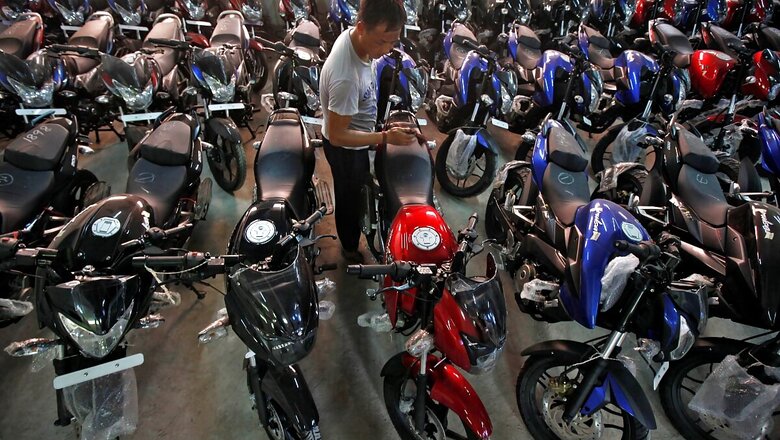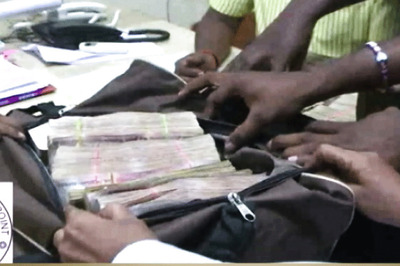
views
In the April to June quarter this year, two of the biggest challenges before Indian businesses were non-existent sales and earnings drying up. As a long and hard nationwide lockdown started at the end of March, companies struggled with prolonged business closures and had to find never-before solutions to stay afloat. But the situation has somewhat turned on its head now, as the festival season nears.
Typically, festive season sales are multiple times those of other months for many product segments, including cars, bikes and jewellery. This is the also peak season for air travel and travel by road and rail. During this period, some fast moving consumer goods (FMCG) companies also witness manifold jump in sales of soft drinks, biscuits, sweets, and even juices.
The festival of Teej was celebrated on Thursday across north India; Eid al-Adha and Raksha Bandhan will be celebrated in the first week of August, followed by Ganesh Chaturthi later in the same month. Of course, peak festivities will happen in late September and October.
This year, while businesses will anyway face a fallout of the pandemic, Covid-19 may not be the only party pooper. Several other issues have also cropped up.
Take the case of Bajaj Auto, the two-wheeler maker which has consistently been in the headlines for opposing all forms of lockdown and continuing to produce vehicles at its various factories. Analysts now say that motorcycle inventory for Bajaj is less than a month away and supplies are in a “hand-to-mouth” situation across the two-wheeler industry as a whole. Put simply, this means that in case there is a surge in demand -- which is what the industry is hoping for during the festival season around Dussehra and Diwali -- vehicle supplies will be unable to keep up.
Nikunj Sanghi, Past Dealerships of the Federation of Automobile Dealers Association (FADA) said, “The 32 days of festival season typically bring twice the sales volumes vehicle dealers see in any other month of the year. This year, too, festival season will see doubling of sales though we may fall short of the numbers seen last year, due to the Covid-19 fallout. This year, supply chain continues to be the weakest link for automobiles because no manufacturer has achieved full production. That is because component makers -- especially those in auto clusters -- are facing problems. Also, there is no clear-cut order book with manufacturers due to Covid-19 uncertainty. Retailers build inventory each year during the shraadh paksh when retail sales dwindle. But will such build-up happen this year, with supplies still constrained?”
Another industry veteran pointed out that restrictions around import of components from China have also hurt the auto industry’s revival prospects. Nearly 26% of the industry has been dependent on imports from China and it is rather tough to immediately replace Chinese imports with indigenous spares. So dealers across vehicle categories are forced to operate on 3-4 day inventory versus 45 days earlier. They may be ill-equipped now to handle a rise in demand during the festival season.
While car and bike dealers are facing low inventory issues, airlines are saddled with so much excess inventory -- seats -- that they are faced with unprecedented challenges in just staying afloat. After severe capacity limits placed by the government, airlines have now been allowed to offer up to 50% of their capacities on domestic routes. But low demand has meant not all airlines have deployed even this permitted capacity. Discretionary travel is still affected severely due to intensity of the pandemic, staggered lockdowns by several states and continued decline in overall business activity.
The upcoming festival season -- the peak season for the airline business -- is also unlikely to bring much relief. In these circumstances, India’s airlines are looking to delay scheduled deliveries of new aircraft, reduce existing fleet sizes through different means and even return aircraft already taken on lease.
According to global aviation consultancy CAPA, the industry could be saddled with a surplus of 200-250 aircraft this year and airlines may return more than 100 aircraft.
For the jewellery sector, the challenge has become attracting buyers as prices of the yellow metal touch record highs. For at least one day this week, gold prices touched the Rs 50,000 per 10 gram mark. Potential buyers have already been singed by income disruption and fear of loss of livelihoods, but with record gold prices, jewellers do not foresee any surge in demand this festive season.
The FMCG industry has been an outlier since the nationwide lockdown, with sales of biscuits, milk and milk products etc. surging as people stayed indoors. RS Sodhi, MD of Gujarat Cooperative Milk Marketing Federation (which sells the Amul brand of products), said that while there were no issues in either milk procurement or production, OOH (out of home) demand is definitely going to be impacted this festival season.
Sodhi said a considerable part of industry sales comes from restaurants, marriages and the catering business, and all these have been severely impacted by the pandemic. Ice cream sales were down to almost half this summer due to the pandemic; demand for milk has reduced in certain cities because of rising number of containment zones and intermittent lockdowns. So the issue plaguing the otherwise robust FMCG sector is the distribution problems that crop up as states announce unilateral lockdowns.
Sodhi gave the example of Kolkata, where milk supplies by Amul were disrupted even on Friday morning as the city was under a lockdown between 6-10 am. All in all, demand in the festive season could fall by a fifth due to the combined effect of intermittent lockdowns, reduction in out of home consumption and distribution problems.




















Comments
0 comment